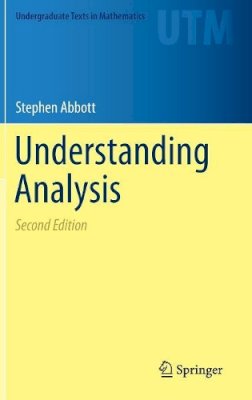15%OFF
Stock image for illustration purposes only - book cover, edition or condition may vary.
Understanding Analysis
Stephen Abbott
FREE Delivery in Ireland
Description for Understanding Analysis
Hardback. Series: Undergraduate Texts in Mathematics. Num Pages: 312 pages, 36 black & white illustrations, biography. BIC Classification: PBK. Category: (P) Professional & Vocational. Dimension: 245 x 163 x 19. Weight in Grams: 596.
This lively introductory text exposes the student to the rewards of a rigorous study of functions of a real variable. In each chapter, informal discussions of questions that give analysis its inherent fascination are followed by precise, but not overly formal, developments of the techniques needed to make sense of them. By focusing on the unifying themes of approximation and the resolution of paradoxes that arise in the transition from the finite to the infinite, the text turns what could be a daunting cascade of definitions and theorems into a coherent and engaging progression of ideas. Acutely aware of the ... Read moreneed for rigor, the student is much better prepared to understand what constitutes a proper mathematical proof and how to write one.
Fifteen years of classroom experience with the first edition of Understanding Analysis have solidified and refined the central narrative of the second edition. Roughly 150 new exercises join a selection of the best exercises fromthe first edition, and three more project-style sections have been added. Investigations of Euler’s computation of ζ(2), the Weierstrass Approximation Theorem, and the gamma function are now among the book’s cohort of seminal results serving as motivation and payoff for the beginning student to master the methods of analysis.
Show Less
Product Details
Publisher
Springer-Verlag New York Inc.
Series
Undergraduate Texts in Mathematics
Place of Publication
New York, United States
Shipping Time
Usually ships in 4 to 8 working days
About Stephen Abbott
Stephen D. Abbott is Professor of Mathematics at Middlebury College. He is a two-time winner of Middlebury’s Perkins Award for Excellence in Teaching (1998, 2010). His published work includes articles in the areas of operator theory and functional analysis, the algorithmic foundations of robotics, and the intersection of science, mathematics and the humanities.
Reviews for Understanding Analysis
“The choice of topics is a happy combination of the essential and the interesting, all truly leading to an understanding of what analysis is and what questions it addresses, aided by the author’s extraordinarily lucid exposition. … Summing Up: Highly recommended. Upper-division undergraduates.” (D. Robbins, Choice, Vol. 53 (2), October, 2015) “This is the second edition of a text ... Read morefor an undergraduate course in single-variable real analysis. … The topics covered in this book are the ones that have, by now, become standard for a one-semester undergraduate real analysis course … . Overall, this book represents, to my mind, the gold standard among single-variable undergraduate analysis texts.” (Mark Hunacek, MAA Reviews, June, 2015) “This is a dangerous book. Understanding Analysis is so well-written and the development of the theory so well-motivated that exposing students to it could well lead them to expect such excellence in all their textbooks. … Understanding Analysis is perfectly titled; if your students read it, that’s what’s going to happen. This terrific book will become the text of choice for the single-variable introductory analysis course; take a look at it next time you’re preparing that class.” — Steve Kennedy, MAA Reviews “Each chapter begins with a discussion section and ends with an epilogue. The discussion serves to motivate the content of the chapter while the epilogue points tantalisingly to more advanced topics. … I wish I had written this book! The development of the subject follows the tried-and-true path, but the presentation is engaging and challenging. Abbott focuses attention immediately on the topics which make analysis fascinating … and makes them accessible to an inexperienced audience.” — Scott Sciffer, The Australian Mathematical Society Gazette Show Less

